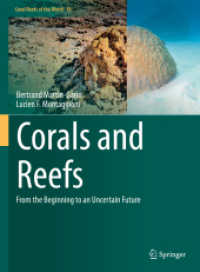- ホーム
- > 洋書
- > 英文書
- > Religion / Ethics
基本説明
Seeks to provide a holistic model that delivers concrete ethical guidelines for societies striving to build peace.
Full Description
In the wake of massive injustice, how can justice be achieved and peace restored? Is it possible to find a universal standard that will work for people of diverse and often conflicting religious, cultural, and philosophical backgrounds?
In Just and Unjust Peace, Daniel Philpott offers an innovative and hopeful response to these questions. He challenges the approach to peace-building that dominates the United Nations, western governments, and the human rights community. While he shares their commitments to human rights and democracy, Philpott argues that these values alone cannot redress the wounds caused by war, genocide, and dictatorship. Both justice and the effective restoration of political order call for a more holistic, restorative approach. Philpott answers that call by proposing a form of political reconciliation that is deeply rooted in three religious traditions--Christianity, Islam, and Judaism--as well as the restorative justice movement. These traditions offer the fullest expressions of the core concepts of justice, mercy, and peace. By adapting these ancient concepts to modern constitutional democracy and international norms, Philpott crafts an ethic that has widespread appeal and offers real hope for the restoration of justice in fractured communities. From the roots of these traditions, Philpott develops six practices--building just institutions and relations between states, acknowledgment, reparations, restorative punishment, apology and, most important, forgiveness--which he then applies to real cases, identifying how each practice redresses a unique set of wounds.
Focusing on places as varied as Bosnia, Iraq, South Africa, Germany, Sierra Leone, Timor-Leste, Chile and many others--and drawing upon the actual experience of victims and perpetrators--Just and Unjust Peace offers a fresh approach to the age-old problem of restoring justice in the aftermath of widespread injustice.
Contents
Introduction ; Part One: Reconciliation as a Concept of Justice ; Chapter One: Whose Justice? ; Chapter Two: The Basic Standards of Justice ; Chapter Three: The Wounds of Political Injustice ; Chapter Four: Reconciliation as a Concept of Justice ; Chapter Five: Is Reconciliation Fit for Politics? ; Part Two: Religion and Reconciliation ; Chapter Six: Is Religion Fit For Reconciliation? ; Chapter Seven: Reconciliation in the Jewish Tradition ; Chapter Eight: Reconciliation in the Christian Tradition ; Chapter Nine: Reconciliation in the Islamic Tradition ; Part Three: Practicing Political Reconciliation ; Chapter Ten: Four Practices: Building Institutions for Social Justice, Acknowledgment, Reparations, and Apology ; Chapter Eleven: Punishment ; Chapter Twelve: Forgiveness ; Conclusion








